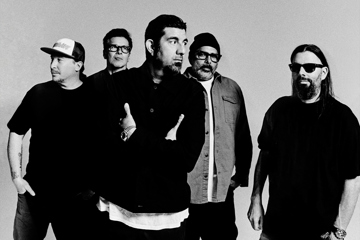Divine Intervention
“When you think about it that way, you know, it is a job. To write the songs is one thing, but then to have all of them in a collection released by a label, you owe that label."

Om well and truly exist on the peripheries of popular music. There's a few reasons for this. First of all, there's only two members of the band: Al Cisneros, former bassist of seminal doom/drone stoners Sleep, and Emil Amos, the prolific songwriter and drummer of avant-garde outfits Holy Sons and Grails. Then there's the overarching content of Om recordings: heavily embedded in theology and philosophy, Om songs are built off of traditional and ritualistic religious rights, spanning every religious design from Christianity to ancient Dharmic Hinduism, hence their moniker. Building on the mantra of “om”, the duo record subtly amazing, chant-inspired soliloquies that stretch and meander through their source material. Those factors combined mean they're obviously not top 40 fodder, but their brilliant uniqueness has garnered them a cult following, and on the eve of an Australian national tour, things are looking more, well, exposed for Om.
“Well, it's kinda strange,” Emil Amos answers on the current goings-on for himself and Cisneros from his home in Portland. “It feels like all of the bands have kind of reached their apex of productivity at this very moment. Literally like, today, this week. It's a great thing, but man, the coordination just this week has been brutal. I wake up, and all day I just sit there and I have to pound out emails, make phone calls, do interviews or sketch out the touring route. But I have to do that for each one of the bands, so it's really pretty brutal,” he laughs. The other bands Amos refers to are his other projects in Grails, Holy Sons and relatively untested avant-psych project Lilacs & Champagne. For years, these acts have been efforts of duty for Amos: he, and his bandmates, have handled all angles of the business of being a band, aside from label distribution and promotion. “It all has to be systematised and kinda consolidated under all these different categories,” he continues. “Since we work with all different labels with each band, they can't be conglomerated. But the booking and the publicists, things like that, can be conglomerated. When I was growing up and I wanted to write a song, I just wrote a song. Nowadays, I can't. I wanna reach for my guitar, but I can't, because I'm doing my taxes, or I have to buy a plane ticket, you know?”
It's an exceptional amount of effort that Amos puts on himself, but for him, it's part of the entire artistic process, one which he wouldn't see diluted by outside interference. Apart from being a necessary evil, it's imperative to his work. “It's necessary in the sense that we've reached a professional level where I can support myself just on music now,” he explains. “When you think about it that way, you know, it is a job. To write the songs is one thing, but then to have all of them in a collection released by a label, you owe that label. It does work, because they do promote it. That's an obligation to yourself. Sometimes, it's really difficult, and you can't even understand exactly why you're so bogged down with just, emails or something. You want to go play music, but… It's part of the equation of being moderately successful, too. So it's like, you have to stop and be thankful that anybody wants to talk to you or listen to your music. I mean, first of all, if you're a real artist, you want the control anyway, because you can't stand anyone misrepresenting you.”
Don't miss a beat with our FREE daily newsletter
When Om formed in 2003, it was an undefined and vague project in the minds of Cisnero and fellow ex-Sleep member, drummer Chris Hakius. Between then and 2007's Pilgrimage, the two developed the defining sound of Om, with a pinpoint balance between Hakius' drumming and Cisnero's bass. When Hakius decided that he didn't want to take part anymore, Cisnero called Amos. Usually associated with avant-garde and experimental post-rock and folk projects, it was a big step to join a stoner metal-influenced drone project, but it was a destined fit. “I knew it was going to be entirely challenging, because my style on drums is pretty undisciplined,” Amos says. “As a drummer, I wanted to basically forego what we do in Grails. I wanted to not have the timekeeper role, and almost make the bass guitar the metronome of the band, so I could flutter around. I want to kind of redefine what a drummer does. If you listen to, like, especially the first Grails record [The Burden Of Hope], you can hear that I'm not really wanting to play, well, beats, necessarily. By the time the Om offer came along, it just seemed like a natural challenge; to move to the next phase and try to see if I could serve as a completely different entity in a band.”
Since then, Om has become something beyond what Cisnero's original expectations might have been. Om's fifth album – the second with Amos – Advaitic Songs was released mid-last year. It immediately surprised the music public: those that were used to the drone/doom of Sleep were given epic harmonic motifs, and those expecting the investigational try-everything mandate of Amos' work were given a driving, guttural chant. Over five tracks, Advaitic Songs delve as deep into religious consequence and ideal as any other contemporary release. And that wasn't just some kind of divine accident; starting with 2008's God Is Good, Amos and Cisnero have been exploring and defining religious experience through music better than anyone. Advaitic Songs is just a step in that journey. “It didn't feel like we were doing anything especially new to us,” Amos explains of recording the latest album. “We felt like we were approaching it pretty much like we had been before, with the same message as God Is Good. But I guess I would say the one thing that was really, really different from God Is Good to Advaitic Songs is that the new record took way longer,” he laughs.
“Basically, we moved just as slow as we wanted to; we didn't rush a single thing. I think we worked in something like four to five different studios, and we used different engineers. I mean, God Is Good was recorded with Albini, so it was very much like you live with him, in his studio which is also his house, basically. So you live with him for about a week, and you make your record. It's done. Advaitic Songs was doing the same thing, with the same amount of focus, but stretched out over about two years.”
Advaitic Songs and its predecessor truly ring of works of deep exploration: Amos has, in the past, expressed the hope that his music will be realised as the act of “facing your own personal reality”. As exhausting as that may seem, he's confident that his work with Om, and with whatever other project takes form in his journey, will not end anytime soon. “Actually I was just talking to Al today. He's sending me some sessions of some new songs we're working on. We're even talking about starting a whole new series of a whole new sound of Om releases that would be a whole series of different kinds of ambient music. We did expand the sound on the new record, but it's expanding even more now. I'm surprised; it never seems to stop. The momentum just keeps going.”







